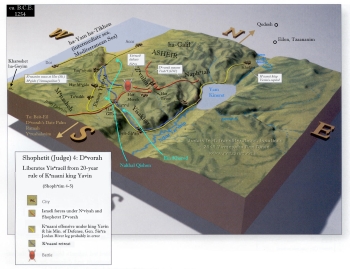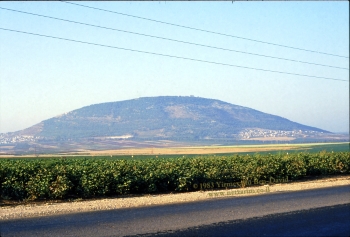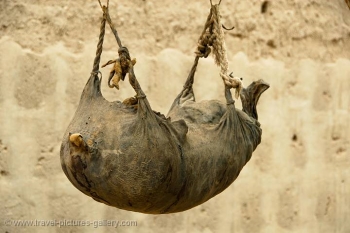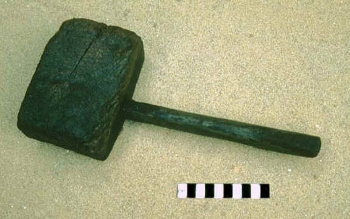
 |

 |
Before all of this, there was a Qein•iyꞋ,![]() named KhëvꞋër,
named KhëvꞋër,![]() who had moved north from the QaꞋyin
who had moved north from the QaꞋyin![]() tribal region of the NëgꞋëv, haing migrated north to pitch
tribal region of the NëgꞋëv, haing migrated north to pitch![]() his tent in Eil•ōnꞋ-Tza•an•imꞋ – nearby QëdꞋësh.
his tent in Eil•ōnꞋ-Tza•an•imꞋ – nearby QëdꞋësh.
Now Shō•phëtꞋët DᵊvōrꞋâh arranged for a "leak" of deceptive intelligence, via a Qein•iyꞋ![]() conduit,
conduit,![]() to Kᵊna•an•iꞋ Gen. SiꞋsᵊrâ.
She planted a false report that Gen. Bâ•râqꞋ Bën-Av•i-NōꞋam had set up an outpost on Har Tâ•vōrꞋ with a commanding view of the plains south, threatening his coastal region.
to Kᵊna•an•iꞋ Gen. SiꞋsᵊrâ.
She planted a false report that Gen. Bâ•râqꞋ Bën-Av•i-NōꞋam had set up an outpost on Har Tâ•vōrꞋ with a commanding view of the plains south, threatening his coastal region.
 |
Upon learning the "leaked" intel about Gen. Bâ•râqꞋ's supposedly threatening troop movement, Kᵊna•an•iꞋ Gen. SiꞋsᵊrâ mustered all 900 of his iron chariots and all of his troops from 'Goy•imꞋ-Engraver City'),![]() to NaꞋkhal Qish•ōnꞋ, which they had to cross to the north side in order to engage the troops of Gen. Bâ•râqꞋ on the plains of òÅîÆ÷ éÄæÀøÀòÆàì by Har Tâ•vōrꞋ.
to NaꞋkhal Qish•ōnꞋ, which they had to cross to the north side in order to engage the troops of Gen. Bâ•râqꞋ on the plains of òÅîÆ÷ éÄæÀøÀòÆàì by Har Tâ•vōrꞋ.
 |
As soon as Shō•phëtꞋët DᵊvōrꞋâh had "leaked" the intelligence to bait Gen. SiꞋsᵊrâ to cross NaꞋkhal Qish•ōnꞋ, she ordered Gen. Bâ•râqꞋ to set up an ambush![]() on the north bank of NaꞋkhal Qish•ōnꞋ for the chariots of Gen. SiꞋsᵊrâ, which é‑‑ä was bringing (via the Qein•iyꞋ
on the north bank of NaꞋkhal Qish•ōnꞋ for the chariots of Gen. SiꞋsᵊrâ, which é‑‑ä was bringing (via the Qein•iyꞋ![]() ma•lâkhꞋ é‑‑ä of the intelligence "leak" – the working of é‑‑ä). The Qein•iyꞋ
ma•lâkhꞋ é‑‑ä of the intelligence "leak" – the working of é‑‑ä). The Qein•iyꞋ![]() ma•lâkhꞋ é‑‑ä preceded Bᵊn•eiꞋ-Yi•sᵊrâ•eilꞋ, passing through the ambush site on his way south before they set up the ambush.
ma•lâkhꞋ é‑‑ä preceded Bᵊn•eiꞋ-Yi•sᵊrâ•eilꞋ, passing through the ambush site on his way south before they set up the ambush.
 350x263.jpg) |
"Bug out!" she ordered. "Get the ambush ready and thoroughly hidden on the north bank of NaꞋkhal Qish•ōnꞋ! Today is the day in which é‑‑ä will have delivered Gen. SiꞋsᵊrâ into your hand. See? The ma•lâkhꞋ é‑‑ä has already preceded you."
So é‑‑ä KO'd Gen. SiꞋsᵊrâ with all of his iron chariots; and all of his camp were being put to the sword in front of Gen. Bâ•râqꞋ.
But, in the confusion of battle, Gen. SiꞋsᵊrâ had jumped down from his chariot and, unnoticed, fled on foot.
Crossing the naꞋkhal southward, Bᵊn•eiꞋ-Yi•sᵊrâ•eilꞋ wiped out every chariot all the way to 'Goy•imꞋ-Engraver City'. They put them all to the sword, until there wasn't a man left. Focused so intently on looking for chariots, though, Gen. Bâ•râqꞋ hadn't noticed Gen. SiꞋsᵊrâ escaping on foot, headed for his capital of Khâ•tzōrꞋ.
Meanwhile, by the time Gen. SiꞋsᵊrâ had trekked up the coast and through the mountains as far as the tent of Yâ•eilꞋ (wife of KhëvꞋër the Qein•iyꞋ, in Eil•ōnꞋ-Tza•an•imꞋ), on his way to Khâ•tzōrꞋ, he was exhausted. Since there was a peace agreement between Yâ•vinꞋ, mëlꞋëkh Kᵊna•anꞋ, and Beit KhëvꞋër (the Qein•iyꞋ), he was feeling safer and somewhat relieved.
 |
Seeing him struggling, alone, and recognizing that it was Gen. SiꞋsᵊrâ, Yâ•eilꞋ realized that he was on his way to the nearby capital of Khâ•tzōrꞋ and recognized a once-in-a-lifetime opportunity. Going out to meet him, she prevailed on him. "Take a break and rest-up here," she implored him. "Don't worry!" So he took a break from his journey and lay down in the tent, where she covered him with a blanket.
"May I have some water to drink?" he requested. "I'm very thirsty." So she brought a goatskin of milk and gave it to him. Then she covered him again with the blanket.
Then he said to her, "Stand in the door of the tent. If any man comes and asks if there's any man here, you tell him 'No'!"
 350x246.jpg) |
When Gen. SiꞋsᵊrâ finally went into a deep sleep, Yâ•eilꞋ (KhëvꞋër's wife) got a tent-peg and a hammer. Very quietly, she kneeled down beside him. Holding the tent-peg in one hand ver-r-r-y gently against his temple, THUD!!! She brought the hammer down as hard as she could on the tent-peg, driving it through his head, nailing his head to the ground! So he died where he lay in the tent.
 |
Meanwhile, Gen. Bâ•râqꞋ, in pursuit of Gen. SiꞋsᵊrâ, was passing by Yâ•eilꞋ's tent. She saw him and came out and intercepted him. "Come with me," she said to Gen. Bâ•râqꞋ. "I will take you to the man you're looking for." So he followed her to her tent where Gen. SiꞋsᵊrâ lay dead with his head nailed into the ground by the tent-peg.
So, that day, ël•oh•imꞋ conquered Yâ•vinꞋ, mëlꞋëkh Kᵊna•anꞋ, from before Bᵊn•eiꞋ-Yi•sᵊrâ•eilꞋ.
Henceforth, yâd Bᵊn•eiꞋ-Yi•sᵊrâ•eilꞋ went absolutely harsh on Yâ•vinꞋ, mëlꞋëkh Kᵊna•anꞋ, until they had excised Yâ•vinꞋ, mëlꞋëkh Kᵊna•anꞋ.

Optional parental preparation:
Bᵊn•eiꞋ-KhōꞋvâv, the people of the father-in-law of Mōsh•ëhꞋ.
As one can see only in the Hebrew spellings, while the adjective, ÷ÌÅéðÄé(í), is a cognate of the proper noun, ÷ÌÇéÄï, neither of these are grammatically related to the proper noun, ëÌÀðÇòÇï, nor its adjective cognate, ëÌÀðÇòÇðé(í). ![]()
åÇéÌÅè – same verb used in Biblical Hebrew to describe é‑‑ä "spreading forth" the universe. (Modern Hebrew has evolved to connote a (pre)inclination, predisposition or tendency.) ![]()
How is plowing like engraving?
Questions you might anticipate that your child might raise and be prepared to discuss:
What does it mean to "pitch" a tent?
What does it mean to "leak" information? Why would one deliberately leak information?
What does "coastal" mean?
What is a geographic "plain"?
What does it mean to "bait" (lure) someone?
What is an ambush?
What does "Bug out!" mean? (an emergency departure)
What does it mean to "deliver" a military force "into your hand"?
What does "precede" mean?
What does "put to the sword" mean?
![]()
 |
 |